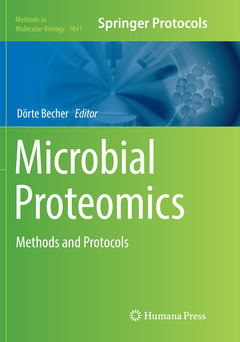Microbial Proteomics, Softcover reprint of the original 1st ed. 2018 Methods and Protocols Methods in Molecular Biology Series, Vol. 1841

1. Filter-Aided Sample Preparation for Proteome Analysis
Jacek R. Wiśniewski
2. Protein Enrichment from Highly Dilute Samples with StrataClean
Florian Bonn and Andreas Otto
Part II: Subcellular Fractionation
3. Membrane Proteomics in Gram-Positive Bacteria: Two Complementary Approaches to Target the Hydrophobic Species of Proteins
Susanne Sievers
4. Enrichment of Cell Surface-Associated Proteins in Gram+ Bacteria by Biotinylation or Trypsin Shaving for Mass Spectrometry Analysis
Florian Bonn, Sandra Maaß, and Jan Maarten van Dijl
5. Preparation of Bacterial Magnetosomes for Proteome Analysis
Oliver Raschdorf, Dirk Schüler, and René Uebe
6. Analysis of Legionella Metabolism by Pathogen Vacuole Proteomics
Christian Manske, Ivo Finsel, Christine Hoffmann, and Hubert Hilbi
Part III: Protein Quantification
7. Detection and Identification of Low-Abundant Proteins Using HPE Gels, Fluorescent Stains, and MALDI-ToF-ToF-MS
Martin Moche, Dirk Albrecht, Reiner Westermeier, and Knut Büttner
8. Applications of Difference Gel Electrophoresis (DIGE) on the Study of Microorganisms
Kathleen Trautwein and Ralf Rabus
9. Proteomic Signatures in Staphylococcus aureus
Susanne Engelmann and Stephan Fuchs
10. How to Assess Protein Stability: Half-Life Determination of a Regulatory Protein in Bacillus subtilis
Alexander Reder, Stephan Michalik, and Ulf Gerth
11. Absolute Protein Quantification Using AQUA-Calibrated 2D-PAGE
Sandra Maaß
12. Sulfur-34S and 36S Stable Isotope Labeling of Amino Acids for Quantification (SULAQ34/36) of Proteome Analyses
Florian-Alexander Herbst, Nico Jehmlich, Martin von Bergen, and Frank Schmidt
13. Metabolic Labeling of Microorganisms with Stable Heavy Nitrogen Isotopes (15N)
Andreas Otto
14. Next-Generation Trapping of Protease Substrates by Label-Free Proteomics
Claudia Lindemann, Nikolas Thomanek, Katja Kuhlmann, Helmut E. Meyer, Katrin Marcus, and Franz Narberhaus
15. In Vivo Proteomics Approaches for the Analysis of Bacterial Adaptation Reactions in Host-Pathogen Settings
Henrike Pförtner, Maren Depke, Kristin Surmann, Frank Schmidt, and Uwe Völker
Part IV: Analysis of Post Translational Protein Modifications
16. Phosphopeptide Enrichment from Bacterial Samples Utilizing Titanium Oxide Affinity Chromatography
Boumediene Soufi, Christoph Täumer, Maja Semanjski, and Boris Macek
17. Phosphoproteomics in Microbiology: Protocols for Studying Streptomyces coelicolor Differentiation
Angel Manteca, Beatriz Rioseras, Adelina Rogowska-Wrzesinska, and Ole N. Jensen
18. Thiol-Redox Proteomics to Study Reversible Protein Thiol Oxidations in Bacteria
Martina Rossius, Falko Hochgräfe, and Haike Antelmann
Part V: Metaproteomics
19. Sequential Isolation of DNA, RNA, Protein, and Metabolite Fractions from Murine Organs and Intestinal Contents for Integrated Omics of Host-Microbiota Interactions
Pranjul Shah, Emilie E.L. Muller, Laura A. Lebrun, Linda Wampach, and Paul Wilmes
20. Utilization of a Detergent-Based Method for Direct Microbial Cellular Lysis / Proteome Extraction from Soil Samples for Metaproteomics Studies
Karuna Chourey and Robert L. Hettich
21. Sample Preparation for Metaproteome Analyses of Soil and Leaf Litter
Katharina M. Keiblinger and Katharina Riedel
22. Centrifugation-Based Enrichment of Bacterial Cell Populations for Metaproteomic Studies on Bacteria-Invertebrate Symbioses
Tjorven Hinzke, Manuel Kleiner, and Stephanie Markert
Includes cutting-edge methods and protocols for the study of microbial proteomics
Provides step-by-step detail essential for reproducible results
Contains key notes and implementation advice from the experts
Date de parution : 12-2019
Ouvrage de 344 p.
17.8x25.4 cm
Date de parution : 09-2018
Ouvrage de 344 p.
17.8x25.4 cm



